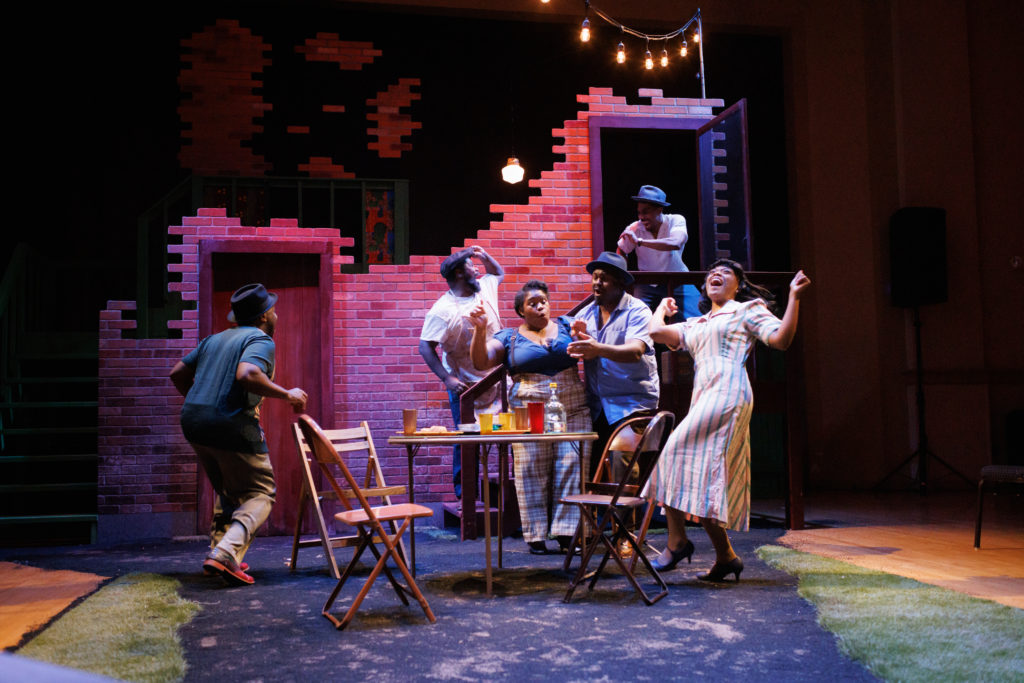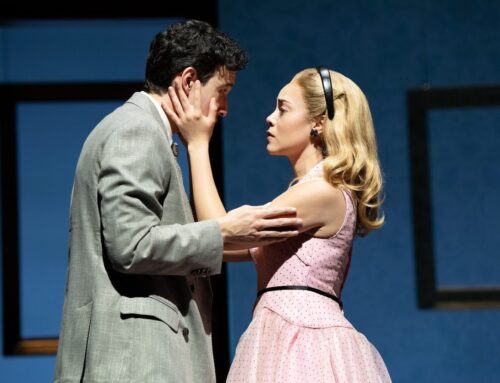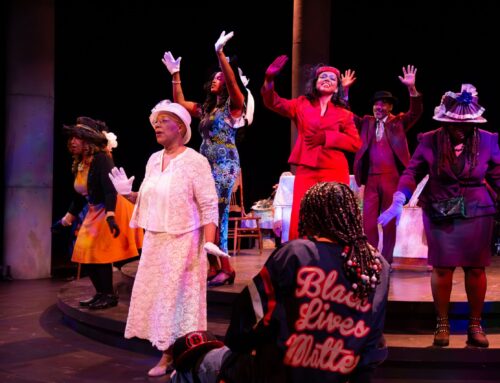A haunting and beautiful production of playwright August Wilson’s most ruminative work, SEVEN GUITARS, is now onstage in the heart of Roxbury at historic Hibernian Hall. Mounted by Actors’ Shakespeare Project with a compelling ensemble cast and directed by resident company member and award-winning actor/director Maurice Emmanuel Parent, the production is a glowing ember in the fiery heart of racial injustice in America. It is the fifth in Pulitzer Prize winner August Wilson’s Century Cycle of 10 plays set in his hometown, Pittsburgh. It is the only play in the cycle that opens with “a note from the playwright” in which Wilson says, “I have tried to extract some measure of truth from [the characters’] lives as they struggle to remain whole in the face of so many things that threaten to pull them asunder.”

Omar Robinson, Johnnie Mack, Regine Vital, Dereks Thomas, Anthony T Goss, and Maya Carter/Photo by Ken Yotsukura Photography
Set in 1948, Seven Guitars sits at the fulcrum of oppressive forces experienced by Black America post World War II. The play begins with an ending– the funeral of the main character– but symbolically, at midcentury, that death occurs on the cusp of something just out of reach. Five friends–Louise, Vera, Hedley, Red Carter, and Canewell are gathered at the funeral of up-and-coming blues musician Floyd Barton. In a nuanced performance, Roxbury-born Anthony T. Goss inhabits Floyd as lean and hungry for success, while beneath the ambition, he remains naive and vulnerable. We watch this play out as the action flashes back to the beginning of the circumstances which lead up to Floyd’s death.
Suddenly with a subtle shift in the light (Amanda E. Fallon), music (Dewey Dellay) and a soundscape (Abe Joyner-Meyers) which puts us on more hopeful ground, we find ourselves in the backyard of a Pittsburgh boarding house delineated by two staircases, the audience on three sides, and beyond on huge panels–sprawling cityscapes enveloping actors and audience alike in this world. A solitary light hangs heavy upstage like a pregnant moon over this evocative set (Jon Savage), visible from within and without.
Floyd returns after 90 days in jail for vagrancy; as we will learn, he has “a hit record but no hit record money”– big city record producers made sure of that. The problem is compounded when Floyd has to pawn his guitar to pay for his mother’s graveside flowers and is then arrested for having no money. Tension and a sense of dread build as we begin to understand the array of forces gathering– a rigged legal system, abusive policing, shady business practices–to undo this Black man. Floyd has also made some bad decisions on the home front when he betrayed the woman he’s always loved and who loves him– the tender but forthright Vera warmly played by Maya Carter whose character is caught between self-preservation and her compassion for Floyd.
As Vera’s friend Louise, Regine Vital is grounded and clear-eyed, describing herself as “forty-eight going on sixty. ” Unencumbered by romance, Louise sees what needs seeing and saying, as smoke from her “Old Gold” cigarettes links her to Hedley, her shaman-like friend from Haiti; his connection to the spirit world and his own broken dreams have driven him a little mad. It’s a tough part to make believable, but Johnnie Mack gets us there along with some very effective stagecraft. As if under a spell, Hedley becomes untethered to the here and now, and he continually relives a dream he had in which his father appeared, promising him that trumpeter Bobby Bolden (sometimes called the “Father of jazz”) will show up and give him a windfall so he can buy a plantation–and liberation. Hedley tells this to Ruby (Valyn Lyric Turner) Louise’s beautiful young niece who comes up from Alabama for a visit (perhaps the only bit of overtly mechanical plotting here) and implores her to father his child.
The richness of Wilson’s plays derives in part from his finely-tuned ear for the rhythms and rhymes of these characters; their dialogue flows with flesh and blood reality, their personal histories weighted by the fraught legacy of racism in America. The play, layered and symbolically complex, recalls the debts owed, the promises broken, the scams run, the generations of roadblocks to success and personhood. But Wilson also invokes the music waiting to be heard, and the fights to be won. We rejoice with Floyd and his bandmates Red Carter (Dereks Thomas) and Canewell (Omar Robinson) as they celebrate heavyweight Joe Louis’s triumph in the ring–but not before a backyard rooster finds somewhere to crow in a city which has no use for it. A world where these seven characters are free to sound their own truths as artists, entrepreneurs, as individuals creating their own destinies– has not yet arrived in SEVEN GUITARS. Here, Wilson harnesses the sorrows and small triumphs of a group of characters doing the best they can “to remain whole in the face of so many things that threaten to pull them asunder.” This penetrating ASP production lingers like a chill and a promise. SEE “SEVEN GUITARS” presented by Actors Shakespeare Project at Hibernian Hall through March 5th.
This production marks the first to receive the Boston Theater Critics Association’s “CRITICS’ PICK” seal of approval!






Leave A Comment
You must be logged in to post a comment.